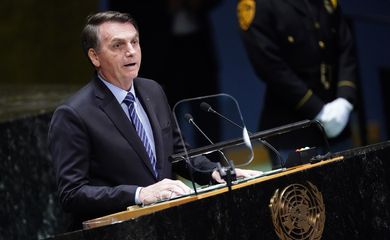In UN speech, Bolsonaro talks about socialism and religion


In his address at the 74th session of the United Nations General Assembly on Tuesday (Sep 24), Brazilian President Jair Bolsonaro mentioned “the reconstruction of Brazil,” which, he said “rises again after being on the brink of socialism.” This, he argued, brought the country “to a situation of generalized corruption, severe economic recession, high crime rates, and ceaseless attacks on family and religious values which have built our traditions.”

In the 30-minute speech with a focus on the environment, Bolsonaro mentioned the Mais Médicos program, created in 2013 in partnership with the Cuban government to send doctors to underserved areas in Brazil—an initiative currently being revamped by his administration.
“This deal between the previous government and the Cuban dictatorship brought to Brazil ten thousand doctors with no professional certificate verified. They were not allowed to bring their spouses and had 75 percent of their salaries confiscated by the regime,” he said. The president described the conditions as “no short of slave labor.”
Socialism
The Brazilian leader talked about the Cuban and Venezuelan governments, and said that “as early as the 60s, Cubans were sent to various countries to help implement dictatorships.” Today, Bolsonaro argued, Venezuela is controlled by Cuban agents brought by former President Hugo Chávez. “Venezuela, formerly a vibrant and democratic country, is now experiencing the cruelties of socialism,” he declared.
The head of state noted that he has worked with other countries to restore democracy in Venezuela and to fight socialism, “which is still alive” in Latin America.
Lula in jail
Bolsonaro said that current Justice and Public Security Minister Sérgio Moro, who spearheaded probes under Operation Car Wash, a crackdown on corruption, among them the case involving ex-president Luiz Inácio Lula da Silva, arrested and sentenced for corruption and money laundering.
“The socialist presidents that preceded me siphoned off hundreds of billions of dollars buying part of the media and the Parliament—all for a project of absolute power,” said Bolsonaro.
In the last decades, he went on to say, an ideological system “was installed on the terrains of culture, education, and the press, taking over the means of communications, universities, and schools” in a bid to “launch an attack on the core of any healthy society—family.”
Freedom, religion, and crime
The Brazilian president reiterated his commitment with the highest standards of human rights, with the defense of democracy and freedom of expression, religion, and press. “It is a commitment that goes hand in hand with the fight against corruption and crime, urgent demands of Brazilian society,” he said, highlighting a 20 percent reduction in the number of homicides in the first six months of his administrations, and record amounts of cocaine and other drugs seized.
Bolsonaro also criticized religion persecution across the world and argued for the creation of the International Day in Remembrance of Victims of Religion-based Violence. It cannot be accepted, he stated, that, in the 21st century, with so many tools available to safeguard rights, that “there are still millions of Christians and people of other religions being deprived of their lives or freedom because of their faith.”
Economy
In the economic arena, Bolsonaro highlighted the opening of the Brazilian economy, the concession program, privatization efforts, and the government’s international agenda aimed at “rescuing the role of Brazil on the global stage and resume ties with key partners.”
“In the quest for prosperity, we’ve been adopting policies to bring us closer to other countries that have developed and consolidated their democracies. There can be no political freedom without economic freedom,” he asserted.
The signing of commercial deals with Mercosur, the European Union, and the European Free Trade Association, as well as Brazil’s entry into the Organization for Economic Cooperation and Development (OECD) were listed by the president as proof that the country is on the right track to regaining political and economic confidence. “We have outdone ourselves by adopting the highest global practices in every field, from financial regulation to environmental protection,” he remarked.
Visa waiver
He also talked about visa waivers for US, Japanese, Australian, and Canadian nationals seeking to come to Brazil, stressing that extending the waiver to Chinese and Indian citizens is also being considered.
Traditionally, it is the task of the Brazilian head of state to deliver a speech opening the General Assembly. The topic of both the general debate and the assembly is “Galvanizing multilateral efforts for poverty eradication, quality education, climate action and inclusion.”
Bolsonaro is expected to fly black to Brazil tonight, and land in Brasilia on Wednesday morning (25).





